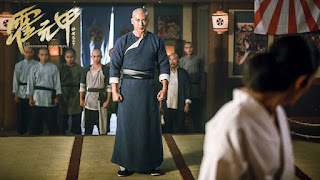Text © Richard
Gary / Indie Horror Films, 2023
Images from
the Internet, unless indicated
The
Grandmaster of Kung Fu (aka The Grandmaster of Kungfu)
Directed by Cheng Si-Yu
Zhonglele Pictures; Well
Go USA Entertainment; Hi-YAH!
75 minutes, 2019 / 2023
https://wellgousa.com/films/grandmaster-kung-fu
www.hiyahtv.com
@WellGoUSA; #TheGrandmasterOfKungFu
Many of the Chinese kung fu/martial arts films of late that date back to a dynasty period, even a later one, tend to be stylized to the point of art, such as Crouching Tiger, Hidden Dragon (2000). This is a natural progression of the old Shaw Bros films of the 1970s-‘80s, but you may wonder whatever happened to the down and dirty fighting of those good old days?
In Mandarin and Japanese (with English subtitles) comes this little ditty that is relatively new to the canon, but has that old time feel, without being VHS blurry images that we all had to get used to when we rented them from the local video store. The period in which this takes place is the end of the Qing Dynasty, which was essentially during World War II, when Japan invaded China and decimated many of the people and cultural icons. It is also the focus of the story, as Japan tries to take over Tianjin, a city dedicated to the martial arts. If the city is wiped out, there are less warriors fighting for their home turf.
When Japan invaded China in 1931, it lasted until the fall of the Japanese Empire in 1945. Japan’s brutal reign over China was short-lived, but was replaced by so-called Communist China in 1949, and was modernized under a different brutal regime. This is also the time period of Ip Man (2008, also released by Well Go USA Entertainment). But enough with the contextual history lesson.
The protagonist of this story is Huo Yuanjia (former World Wushu Champion Du Yuhang (aka Dennis To). He is a lowly porter (with a large house, for some reason) with a wife (Mei Xue) and young child. Of course, he is a master at a specific kung fu, which is not recognized by the official wushu (an umbrella title for a form of kung fu; the other being kuoshu) association of Tianjin, and its new president, Zhao. His becoming the head of the group is the opening sequence of trial by fist and feet. Still, Huo manages to get a single disciple, Chen Zhen.
In comes the Japanese, led by trigger happy Commander Yoshida Masaichi and his Aikido sword wielding superior Colonel Takeda Kamesaburo, who takes over the association’s building to open a forbidden Japanese martial arts school. Of course, just minutes in, it is easy to tell that at some point it will be a fight between Yuanjia and either Masaichi or Kamesaburo in a match of Chinese kung fu vs. Japanese budō. Following the narration of nearly all these kinds of films This is a Chinese martial arts standard, and rightfully so.
Du Yuhang is very likeable, and his style is reminiscent of Donnie Yen (Ip Man). It should come as no surprise that he played the Ip Man character a year later in the prequel, The Legend is Born: Ip Man (2010). As far as the other actors, interestingly, the Japanese are played by Chinese actors, and the Japanese language is dubbed in. The film also stars Gao Xuemei, Yang Yongfeng, Li Ruoxi and Zhuang Han, but I do not know who played which role.
The film relies on a few cliches, such as the championship tournament, Japan’s overreach and malevolence, the final battle, and the one-against-many opponents (including Ninjas!). Because of this there are some formulaic narratives, but hell, we watch this stuff for the, well, Hi-YAH! quality. In this case, the action is both well-choreographed and shot/edited. There is a bunch of wirework, as is par for the course, but no ridiculous flying through the air or jumping from one roof to another. While obvious, it is done only within fights and not over-emphasized (e.g., no jumping from the ground to the top of a building).
My one complaint is that sometimes the subtitles roll by too fast for my aged eyes. But what the hell, it is the action sequences that are the backbone of any martial arts film, and this definitely delivers.
This is director Cheng Si-Yu’s first film and has since made the likes of Land Shark (2020). I am hoping he goes on to do a crime drama, or another martial arts release set in the Feudal period. Meanwhile, there is this gem.
A Hi-YAH!
original, the film is available on the Hi-YAH! martial arts streaming service (link
above), as well on Blu-ray and DVD.
IMBD listing HERE



No comments:
Post a Comment